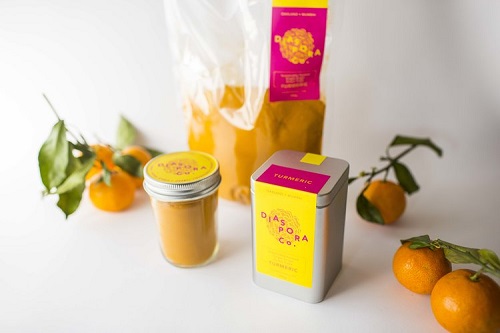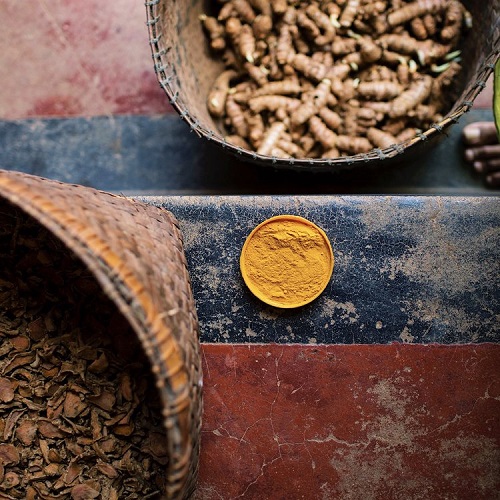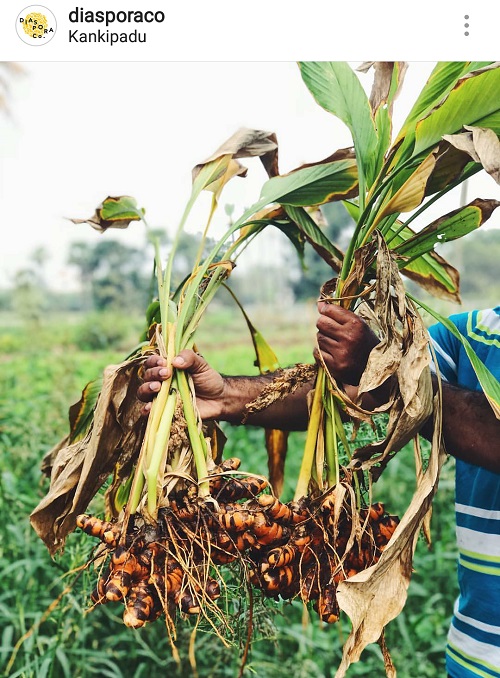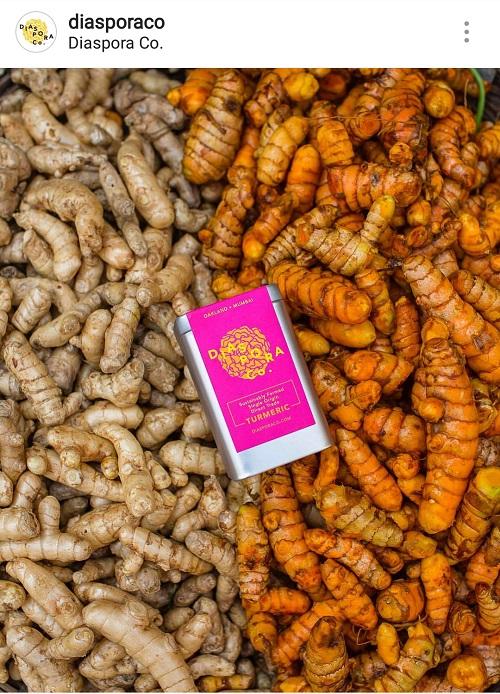Making turmeric lattes beneficial for Indian farmers
Do you remember seeing all those posts on The Golden Milk and its health benefits? Did you look at your screen and scoff at the celebration of something you knew all along? Did you find it amusing or were you plain happy to see this nightly routine of yours gain popularity? For, Sana Javeri Kadri, founder of Diaspora Co., turmeric milk’s surge in popularity raised an important question- How is this impacting the people who grow the turmeric? Over a Skype call, I spoke to Sana about her entry into the world of spices, about turmeric and entrepreneurship with a difference.

From Mumbai to Oakland to Kozhikode
Sana grew up in Bombay in a family of architects. At 16 she attended high school at the United World College, Duino Italy. She then moved to California- Pomona College, to pursue her degree in Visual and Performing Arts. While at Pomona, Sana worked in the organic farm on campus, an experience she says changed her view about food and its origins. “Food was a big part of my life growing up. At Pomona, I needed an on-campus job pretty badly, and I realized that the college had an organic farm in its vicinity. When I grew up in Bombay, I didn’t know anything about farms. Vegetables for me might as well have grown in supermarkets or at the sabzi mandi. I had no concept of a food source. And here I was at this very sweet, two-acre organic farm where everything was sustainable, ethical and all the conversations were aligned with these concepts. Working there gave me the incredible opportunity to learn about this world. That is what I studied- food justice and agriculture. I got a double degree in Food Studies and Arts.”
Sana landed in California at the heart of the food movement. She worked as a marketing coordinator for a food company and at 23, the job was a dream come true. But slowly, things started to mount up. “Suddenly everybody was drinking turmeric latte and talking about this magical drink. This was late 2016, and I kept thinking what is happening? I was working in the food supply chain, and I was well connected. I should have been in a position to understand this shift. But if I asked around about the spices, and where they came were from, I got perfunctory answers like- India I guess, I don’t know. There was no clarity about the source, and for me, it was sad to witness a high-end spice shop charging an arm and a leg for haldi (turmeric) without an idea about its origins.”


In February 2017, Sana moved back to India to explore the world of spices. “There was no real plan. I decided to try and find a farm. I thought maybe I would do a photo project; maybe I will pitch it to a magazine. I just wanted to understand the story behind the spices.”
Sana Javeri Kadri on turmeric and entrepreneurship with a difference. Meet DiasporaCo. #turmericyellow Click To TweetThe Many Shades Of Turmeric
Sana’s pursuit lead her to the doorstep of the Indian Institute of Spices Research in Kozhikode, Kerala. “I kept trying to get in touch with the people at the Indian Institute of Spices Research. I tried emailing, calling, WhatsApping them, but I got no response. After some time, I just decided to show up there and bought myself a ticket. When I landed at the research facility, I got such a warm welcome. Looks like they had been waiting for me all along,” says Sana laughing as she recounts the whole episode.
Sana credits Dr D. Prasath of the Institute for providing her with a wealth of knowledge about turmeric and spices. “When spice trade began, the idea was to create exotic brands around a place. You know like Ceylon tea or Saigon Cinnamon. Similarly, Allepey Finger Turmeric was created in the 1850’s, and it is still considered as the most export ready varietal. But that is just a trickle down of British colonialism. It’s now a blanket term and differentiation between varietals is often based on shade cards. There are so many turmeric varietals, but farmers have no incentive to explore them because they don’t have markets for them. The problem here is a marketing problem. The buyer doesn’t know, and the narrative needs to be fixed.”

Sana learned about Pragati and Pratibha, turmeric strains from IISR which have high curcumin contents. She also got to know about Kasaraneni Prabhu, a fourth-generation farmer in Vijayawada who is working with IISR’s Pragati and was looking for a buyer for his product. “Prabhu has a seven-acre farm outside Vijayawada, and this is his second year growing haldi. He is dedicated to sustainable farming. His family sent him to Pune to study, and they wanted him to get a “good computer job”. After four years he came back saying I don’t want a computer job, I just wanted to farm. He is officially certified organic and my sole source for haldi. It’s just that his goals and values matched my goals and values. He is committed to doing the right thing and really cares about the product.”
Having found the right turmeric, Sana went back and established Diaspora Co. in August 2017. Her aim- if the world is celebrating spices, let’s make sure everyone in the process benefits, specially the farmer providing the spice. By November Diaspora Co. was featured in the New York Magazine Gift Guide. “It went viral from there. I came back to the US hoping to work on this on the side and slowly grow the venture. Instead, it has taken over my life in a great way.”
Entrepreneurship that Encourages
I have to admit I came to know about Sana’s work long before I approached her for an interview. As much as I wanted to talk to her about Diaspora Co. and turmeric, I was equally intrigued by her approach to entrepreneurship. Thorugh her social media posts, Sana encourages fellow artists, chefs, writers and others on a similar, creative path. Even on the Diaspora Co. website we see a gift guide titled “shop desi / WOC / queer / immigrant / direct trade / women-owned“. I asked Sana about this and she said it’s just what she believes in. “I have found success is achieved by having a strong community. A lot of the press that came out last fall was because someone knew about my product, or I happened to follow somebody on Instagram, who then saw my business and wrote about it. It’s always about who you know. I feel very indebted to my community for everything, and I want to be able to give that back. Also, it’s about the values you are promoting. Every part of the Diaspora product is made with so much integrity. We will champion for other businesses that do the same. If you see something on our Facebook or Instagram, you can be sure that they are aligned with our values. It has to be a communal effort if we want to create a positive space.”

Sana shares that moving forward, she is planning to add more spices on the Diaspora Co. shelves. “I am starting work with a few cardamom farmers in Kerala. We are also moving towards ethical packaging from India, which is equally important to us.In the future, I am looking at the whole masala dabba (spice box).” And eventually?, I ask. “The whole world, “she says.
For more information visit https://www.diasporaco.com/.
Pssst.. I didn’t get to mention this in the article, but Sana is also an amazing photographer. Follow her personal Instagram feed and get ready to fall in love with hues of yellow and all things turmeric.
You may also like.
